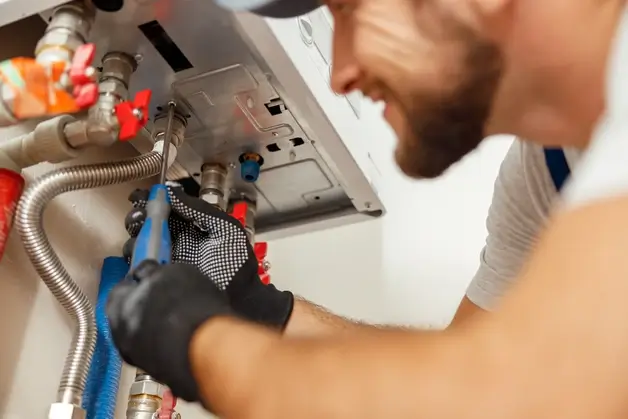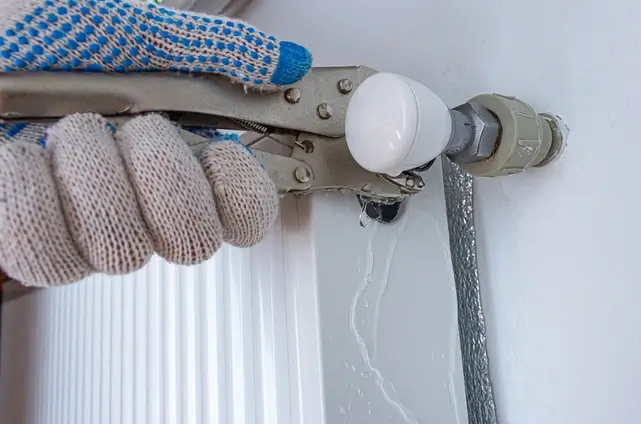No hot water? It’s a major inconvenience, but don’t panic! Before you call a water heater repair service, there are a few quick fixes you can try yourself for common water heater problems. These solutions apply to electric and gas water heaters. But remember: if you’re not comfortable with any of these steps, call a professional.
Safety First!
Don’t forget to shut down the power of your water heater before attempting any water heater repairs. Shut off the cold water supply valve located near the base of the heater too. Open a hot water tap to release pressure. Wear gloves and safety glasses for protection.
No Hot Water? Check the Power!
Did the circuit breaker trip? Check your main electrical panel and reset the breaker for the water heater. If it trips again, there might be a bigger issue–time to call a pro specializing in water heater repairs.
What about your gas water heater? Look for a pilot light. If it’s out, relight it according to your water heater’s manual.
Reset the Thermostat
Both electric and gas water heaters have thermostats that control water temperature. If yours is set too low, you won’t get scorching hot showers, but you’ll still have warm water.
Check your manual for the recommended temperature range (usually 120-140F) and adjust the thermostat accordingly. There might also be a reset button on the thermostat – try pushing it.
Flush Out Sediment Buildup
Over time, mineral deposits can build up in your water heater, reducing its efficiency and leading to water heater problems. Flushing it can help restore hot water and improve energy efficiency. Here’s how:
- Attach a hose to the drain valve at the bottom of the water heater. Route the hose to a drain.
- Open the pressure relief valve briefly (use a bucket to collect any drips) to release pressure. Close it again.
- Open the drain valve slowly. Water will come out with sediment. Let it drain completely.
- Once clear water flows, close the drain valve and reattach the hose.
- Turn on the cold water supply and open a hot water tap to bleed air from the system. Close the tap once hot water flows steadily.
Address Leaks: Not a Quick Fix, But You Can Stop It From Getting Worse
Leaks can be serious. A small leak from a water heater leak can quickly turn into a major flood. If you notice a leak:
- Turn off the water supply immediately.
- Place a bucket under the leak to catch drips.
- Call a water heater repair service as soon as possible. A small leak might require tightening a loose connection, but a larger leak could indicate a failing water heater that needs replacement.
Strange Noises? Check the Pressure Relief Valve
If you hear hissing or popping sounds coming from your water heater, it could be the pressure relief valve. A faulty valve can lead to safety issues. While replacing a pressure relief valve isn’t the quickest fix, it’s a crucial safety measure. If you’re not comfortable doing it yourself, call a plumber specializing in water heater repairs.
Not Enough Hot Water? It Could Be the Heating Element (Electric) or Gas Burner (Gas)
If your water heater runs out of hot water quickly, especially with increased hot water usage, the heating element (electric) or gas burner (gas) might be failing. Replacing these components requires a qualified plumber for water heater repair services.
Water Smells Bad? It’s Not You (Probably)
A rotten egg smell coming from your hot water can indicate a failing anode rod. This rod attracts corrosion, protecting the tank from mineral deposits.
Replacing the anode rod is a relatively simple DIY project for some, but consult your water heater’s manual for specific steps. If you’re not comfortable, consider water heater maintenance services from a professional.
Pilot Light Woes (Gas Water Heaters Only)
Is the pilot light out? Relighting it might be the fix. Check your water heater’s manual for instructions specific to your model.
Does the pilot light stay lit but the burner won’t ignite? There could be a blockage in the gas line or a faulty thermocouple (senses the pilot light flame). Call a plumber for water heater repair services.
Warning Signs You Shouldn’t Ignore
While a few quick fixes can resolve minor water heater issues, some problems call for expert care. If you notice inconsistent heating, strange noises, or leaks, it’s best to contact a professional heater service or water heater repair specialist to prevent further damage and restore efficiency.
- Leaking from the tank itself: This signifies a major problem, and the water heater likely needs replacement.
- Rusty water: This indicates internal tank corrosion due to mineral deposits. Consider water heater replacement or consult a plumber for further diagnosis.
- Rumbling or knocking sounds: This could be sediment buildup or a failing heating element. Regular maintenance can help prevent this issue.
Preventative Maintenance is Key!
Regular water heater maintenance, including drain cleaning and flushing, can help prevent problems before they arise and extend the lifespan of your unit. Aim to flush your water heater every year, especially if you have hard water with high mineral deposits. Here’s a quick refresher:
- Schedule an annual inspection with a licensed plumber specializing in water heater maintenance services. They can check for leaks, sediment buildup, and other potential issues that could lead to water heater problems down the line.
- Invest in a water softener if you have hard water. Hard water minerals contribute to sediment buildup and can shorten the lifespan of your water heater. A softener can improve water quality and energy efficiency.
In Closing
Cold showers are no fun! Take control of your hot water with these tips. Even if a DIY fix isn’t your style, this guide will help you troubleshoot and know when to call in a pro. Remember, peace of mind (and a hot shower!) is just a phone call away.

